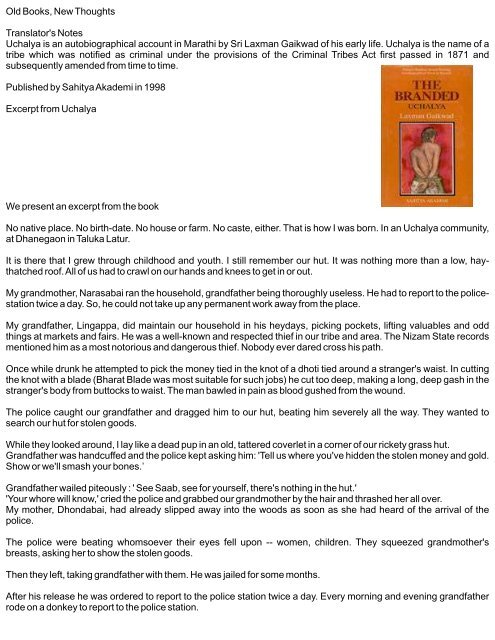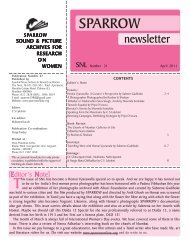The Branded By Sri Laxman Gaikwad - sparrow
The Branded By Sri Laxman Gaikwad - sparrow
The Branded By Sri Laxman Gaikwad - sparrow
- No tags were found...
Create successful ePaper yourself
Turn your PDF publications into a flip-book with our unique Google optimized e-Paper software.
Old Books, New Thoughts<br />
Translator's Notes<br />
Uchalya is an autobiographical account in Marathi by <strong>Sri</strong> <strong>Laxman</strong> <strong>Gaikwad</strong> of his early life. Uchalya is the name of a<br />
tribe which was notified as criminal under the provisions of the Criminal Tribes Act first passed in 1871 and<br />
subsequently amended from time to time.<br />
Published by Sahitya Akademi in 1998<br />
Excerpt from Uchalya<br />
We present an excerpt from the book<br />
No native place. No birth-date. No house or farm. No caste, either. That is how I was born. In an Uchalya community,<br />
at Dhanegaon in Taluka Latur.<br />
It is there that I grew through childhood and youth. I still remember our hut. It was nothing more than a low, haythatched<br />
roof. All of us had to crawl on our hands and knees to get in or out.<br />
My grandmother, Narasabai ran the household, grandfather being thoroughly useless. He had to report to the policestation<br />
twice a day. So, he could not take up any permanent work away from the place.<br />
My grandfather, Lingappa, did maintain our household in his heydays, picking pockets, lifting valuables and odd<br />
things at markets and fairs. He was a well-known and respected thief in our tribe and area. <strong>The</strong> Nizam State records<br />
mentioned him as a most notorious and dangerous thief. Nobody ever dared cross his path.<br />
Once while drunk he attempted to pick the money tied in the knot of a dhoti tied around a stranger's waist. In cutting<br />
the knot with a blade (Bharat Blade was most suitable for such jobs) he cut too deep, making a long, deep gash in the<br />
stranger's body from buttocks to waist. <strong>The</strong> man bawled in pain as blood gushed from the wound.<br />
<strong>The</strong> police caught our grandfather and dragged him to our hut, beating him severely all the way. <strong>The</strong>y wanted to<br />
search our hut for stolen goods.<br />
While they looked around, I lay like a dead pup in an old, tattered coverlet in a corner of our rickety grass hut.<br />
Grandfather was handcuffed and the police kept asking him: 'Tell us where you've hidden the stolen money and gold.<br />
Show or we'll smash your bones.’<br />
Grandfather wailed piteously : ' See Saab, see for yourself, there's nothing in the hut.'<br />
'Your whore will know,' cried the police and grabbed our grandmother by the hair and thrashed her all over.<br />
My mother, Dhondabai, had already slipped away into the woods as soon as she had heard of the arrival of the<br />
police.<br />
<strong>The</strong> police were beating whomsoever their eyes fell upon -- women, children. <strong>The</strong>y squeezed grandmother's<br />
breasts, asking her to show the stolen goods.<br />
<strong>The</strong>n they left, taking grandfather with them. He was jailed for some months.<br />
After his release he was ordered to report to the police station twice a day. Every morning and evening grandfather<br />
rode on a donkey to report to the police station.
Subsequently, they made him a State informer, offering him suitable rewards if he disclosed the names of thieves<br />
and pickpockets belonging to our tribe. He had to accompany the police to help them trace the addresses and<br />
whereabouts of suspected thieves. If he ever failed to report to the police station the police came and beat everybody<br />
in our hut.<br />
Grandfather was thus forced to give up his pilfering business, report to the police regularly, and work as a Nizam<br />
State informer helping the police to catch thieves from our own tribe.<br />
Nobody would offer work to my father, Martand, as we were known to belong to a branded tribe of criminals. <strong>The</strong>y<br />
would not employ my mother, Dhondabai, even as a farm-hand. As grandfather had been rendered useless, my<br />
grandmother began to visit fairs and markets to maintain the household. In crowded fairs, she removed gold lockets<br />
and earrings from children's necks and ears, trinkets and necklaces from the necks of women cutting them loose with<br />
her teeth or a blade, and sold them to moneylenders and maintained the house. Sometimes the police visited our<br />
village in search of thieves or stolen goods. On such occasions local money-lenders and the village patil bribed the<br />
police from our grandmother's deposit with them.<br />
If anyone from our household or tribe wished to leave the place, he had to obtain a permit from the police-patil, a bribe<br />
for the purpose. We were reduced to the level of animals; for just as permits are needed for cattle to be moved to<br />
other places or to be sold in the market, we had to have passes to him where we were going to, and even then, we<br />
could not stay there for more than three days. Barring me - a child - everybody had a pass. If we ever travelled without<br />
a pass we were invariably arrested on trumped-up charges, beaten up, and set free only after exorbitant amounts<br />
had been extracted from us.<br />
Thus the pass came to be worshipped as God and the blade as Laxmi, the goddess of wealth, in our family.<br />
Whenever my grandfather, grandmother and the others in my family set out on a thieving mission, they bought a cock<br />
and sacrificed it to the blade, sprinkled some drops of its blood on the blade and the pass; and prayed: 'O God! Grant<br />
us success; let our thieving operations be blessed with success, save us from the police.' <strong>The</strong>n everybody, in turn,<br />
bowed in obeisance before the blade and the pass just as people do before gods in temples.<br />
(Taken from Chapter 1, page 1 to 3)




